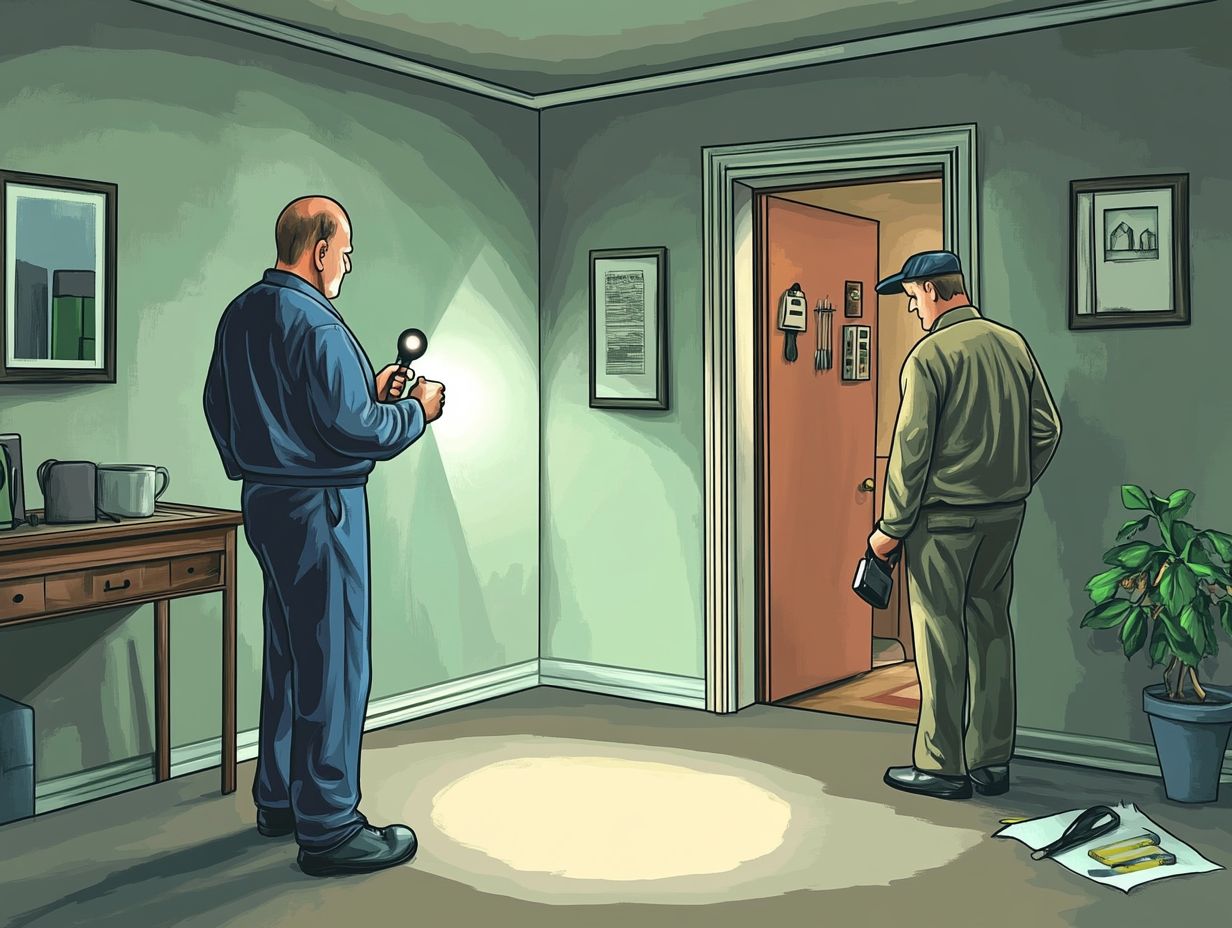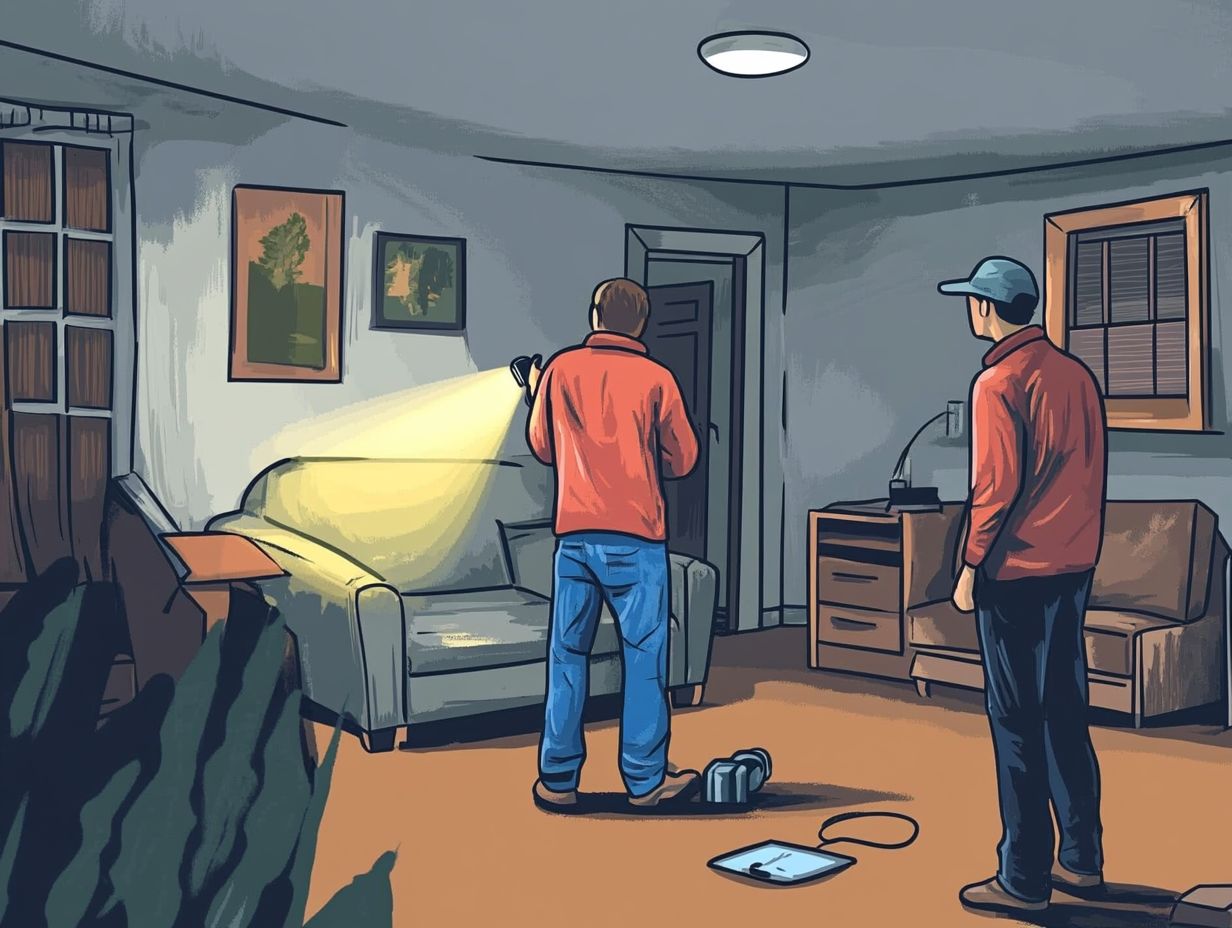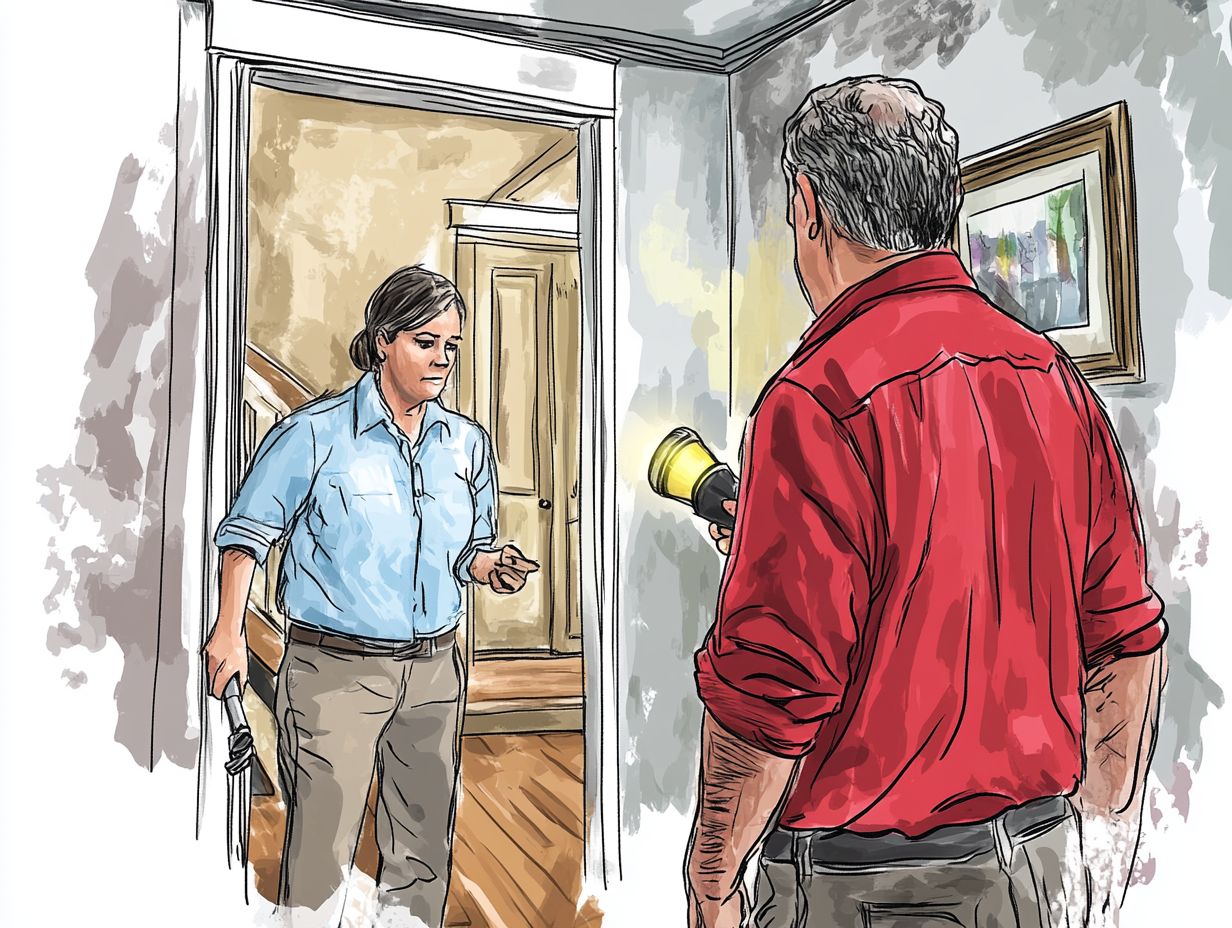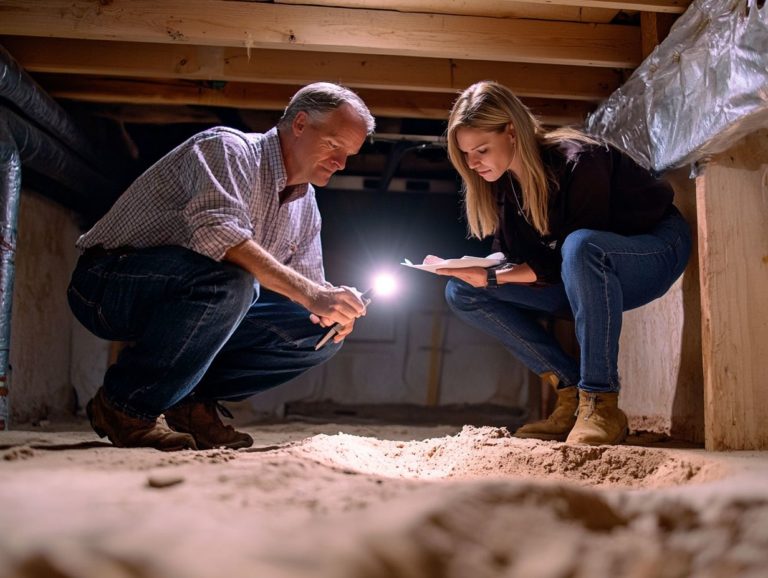Understanding the Home Inspection Process for Sellers
Selling your home can feel overwhelming, but fear not! One important step can make all the difference: the home inspection.
This article covers what a home inspection involves. It explores its significance for you as a seller and how it can influence your sale.
You’ll discover the benefits of obtaining an inspection, learn how to prepare for it, understand what to expect during the process, and explore how to effectively address any findings.
With practical steps and valuable insights, you’ll be well-equipped to navigate this essential phase of selling your home.
Contents
- Key Takeaways:
- What is a Home Inspection?
- Why is a Home Inspection Important for Sellers?
- Preparing for a Home Inspection
- What to Expect During the Inspection
- Addressing Inspection Findings
- Final Steps for Sellers
- Negotiating Repairs and Pricing
- Closing the Sale and Moving Forward
- Frequently Asked Questions
- What is the purpose of a home inspection for sellers?
- Who typically pays for the home inspection?
- What is included in a home inspection?
- Do sellers have to be present during the home inspection?
- What happens if the home inspection reveals major issues?
- Can a seller refuse to make repairs based on the home inspection report?
Key Takeaways:

A home inspection is a thorough examination of a property’s condition, including its structure, systems, and components.
Getting a home inspection can benefit sellers by identifying potential issues that could affect the sale of their home. For more insights, refer to understanding the home inspection process. Addressing these issues beforehand can help increase their asking price.
Sellers should prepare for a home inspection by decluttering and making necessary repairs. During the inspection, they can expect a detailed evaluation of their property’s condition, which may take a few hours to complete.
What is a Home Inspection?
A home inspection is a thorough evaluation of a property carried out by a qualified inspector. The goal is to gauge its overall condition.
This process involves checking different parts of the home, resulting in a detailed inspection report. Understanding the home inspector’s role is crucial, as this report highlights any significant issues that may influence your decisions and affect the property’s value.
Why is a Home Inspection Important for Sellers?
A home inspection is a crucial step in the pre-listing process for sellers. It helps uncover serious issues that could impact your property’s value, making it essential to understand the home selling process.
Additionally, it instills confidence in potential buyers regarding the condition of your home.
Preparing for a Home Inspection
Preparing for a home inspection requires a thoughtful approach. Start by crafting a comprehensive checklist to guide your preparations.
Ensure the home is immaculate, presenting it in the best light possible. Tackle any minor repairs beforehand, as these can significantly enhance the inspector’s experience.
Finally, make sure the inspector has easy access to all areas of the property. This meticulous preparation will help you navigate the inspection process with confidence.
What to Expect During the Inspection
During the inspection, you can anticipate a careful evaluation of various elements, including structural components, heating, ventilation, and air conditioning (HVAC), plumbing, and electrical systems.
The entire process usually spans several hours, depending on the size and condition of the property.
Addressing Inspection Findings

Once the inspection report is in hand, addressing its findings is essential in the negotiation process.
As a home seller, you’ll need to evaluate any repairs flagged as potential deal-breakers and reach a mutual agreement on the terms of negotiation to successfully move forward.
Final Steps for Sellers
As you wrap up the sale, review the buyer’s offer carefully. Consider offering a home warranty to boost buyer confidence and think about any additional costs that may arise during the transaction.
This process is often expertly navigated with the assistance of a seasoned real estate agent.
Definition and Purpose
The purpose of a home inspection is to provide you with an objective assessment of a property’s condition. This helps you make informed decisions and guides sellers on necessary improvements.
This important evaluation gives you clarity about your potential investment. It also holds sellers accountable for addressing any identified deficiencies.
A professional property assessment reveals immediate maintenance needs. Understanding these factors can influence your long-term enjoyment and your new home’s value.
A well-conducted home inspection builds trust in the transaction. This paves the way for smoother negotiations for everyone involved.
Benefits of Getting a Home Inspection
Home inspections offer significant benefits for both sellers and buyers. They enhance property value and strengthen your negotiating power in real estate transactions.
For sellers, these assessments uncover potential issues within the property. Addressing repairs proactively helps you present a more attractive home to buyers, and understanding the home inspection report can be crucial in this process.
Buyers gain critical insights into the property’s condition. This knowledge helps you make informed decisions about repairs and can even influence the purchase price.
Transparency builds trust between both parties. This ultimately ensures a smoother transaction and reinforces your negotiation position.
Steps to Take Before the Inspection
Before a home inspection, focus on cleaning your property and using an inspection checklist. Address necessary repairs and ensure easy access for the inspector.
A thorough cleaning can reveal hidden issues. Taking proactive measures before the inspector arrives can boost your home’s appeal.
Using a checklist helps identify critical areas often overlooked. This allows for timely repairs that can significantly increase your property’s value.
Ensure all doors, attics, and crawl spaces are accessible. This minimizes complications and leads to a more favorable inspection outcome.
Process and Timeline

The inspection process takes several hours. A detailed evaluation of crucial systems, including HVAC, plumbing, and electrical, will influence the overall home appraisal.
The process begins with a visual assessment of the property’s structure. This ensures everything meets safety standards.
After the visual check, the focus shifts to detailed inspections of major systems. These often reveal potential issues that can affect your buying decision.
Inspectors also provide insights into the maintenance needs of these systems. Following the inspection, you’ll receive a detailed report summarizing findings and necessary repairs.
The entire process takes three to five hours, depending on the home’s size and condition. This step is essential in your buying journey.
Negotiating Repairs and Pricing
Negotiating repairs and pricing after you receive the inspection report is a crucial part of the process. Both parties need to address deal-breakers and outline repairs that may influence your offer.
A smart approach for sellers starts with understanding the inspection findings and assessing which issues need urgent attention. By focusing on repairs that could deter buyers or reduce offers, sellers can offer solutions rather than dismiss concerns. For a deeper insight, refer to understanding the home inspection timeline.
Open communication is essential during this phase. Sellers should show they are willing to negotiate and consider alternatives, such as offering credits or reducing the sale price to ease the buyer’s financial burden.
By identifying both significant and minor repairs, sellers can build trust and ensure a smoother transaction, making the negotiation process productive and collaborative.
Closing the Sale and Moving Forward
Closing the sale involves finalizing agreements, exploring home warranty options, and preparing for follow-up costs, often with help from a real estate agent to ensure every term is carefully reviewed.
During this important phase, gather necessary documents like property disclosures and maintenance records, as these can significantly affect the buyer’s decision.
Understanding the buyer’s offer is key. It may include specific requests, like repairs or credits, that you will need to negotiate in your favor.
Pay close attention to the closing costs related to the sale, including title insurance, settlement fees, and possibly transfer taxes.
Considering home warranty options can provide peace of mind for the buyer and enhance your property s appeal, leading to a smoother transaction and successful closing.
Frequently Asked Questions
What is the purpose of a home inspection for sellers?
The purpose of a home inspection for sellers is to identify potential issues or defects in the home that may affect its value. Understanding the home inspection process gives sellers a chance to fix major issues before listing their home!
Who typically pays for the home inspection?

In most cases, the buyer pays for the home inspection. Some sellers may choose to have a pre-listing inspection done to address issues beforehand.
What is included in a home inspection?
A home inspection usually includes a thorough examination of the home’s structure, interior, exterior, mechanical systems, and major appliances. The inspector also checks for safety hazards or code violations.
Do sellers have to be present during the home inspection?
While it’s not mandatory for sellers to be present during the home inspection, it is recommended. This lets sellers ask questions and understand the importance of home inspections and any potential issues found by the inspector.
What happens if the home inspection reveals major issues?
If the home inspection reveals major issues, the seller can either fix them before the market listing or adjust the asking price accordingly. The buyer may also negotiate repair or credit options.
Can a seller refuse to make repairs based on the home inspection report?
Yes, a seller can refuse to make repairs based on the home inspection report. However, this may impact the sale, as the buyer might request a credit or lower the offer price to cover repair costs.
If you have more questions or need assistance, don’t hesitate to reach out for more information!






